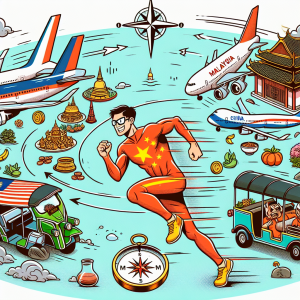ASEAN countries are being urged to deepen their regional trade ties in response to the lingering effects of tariffs imposed by former U.S. President Donald Trump. This call for enhanced cooperation comes at a crucial time as countries within the Association of Southeast Asian Nations (ASEAN) look to bolster their economic resilience and navigate an increasingly complex global trade environment.
As nations like South Korea, China, and Japan ramp up efforts to strengthen regional trade, ASEAN is positioned to play a pivotal role in this dynamic. The imposition of tariffs has prompted many Asian economies to seek greater economic integration through trade agreements that can mitigate the adverse effects of such measures. By fostering closer ties, ASEAN countries can collectively enhance their bargaining power and create a more robust economic framework that is less vulnerable to external shocks.
The Role of APEC in Economic Integration
The Asia-Pacific Economic Cooperation (APEC) forum is central to these efforts, serving as a platform for its 21 member economies, including Singapore and several ASEAN nations. APEC’s focus on promoting balanced and inclusive growth is particularly relevant to Singapore, which heavily relies on trade and investment. The forum’s initiatives aim to facilitate trade by synchronizing regulatory systems and easing the movement of goods and services across borders. This is essential for Singapore’s continued success as a regional trade hub.
Recent data from the U.S. Bureau of Economic Analysis indicates a decrease in the U.S. trade deficit, driven by a rise in exports and a drop in imports. This shift may have significant implications for ASEAN countries, including Singapore, as it could alter trade flows and economic relations with the U.S. As the global economic landscape evolves, it becomes increasingly important for ASEAN to diversify its trade partnerships and strengthen intra-regional ties.
Sustainability and Innovation as Key Focus Areas
In addition to enhancing trade, APEC and regional economic strategies emphasize sustainability and innovation. Initiatives aimed at improving energy efficiency, managing natural resources sustainably, and promoting digital skills are crucial for Singapore as it strives to maintain its competitive edge while addressing pressing environmental challenges. These efforts not only align with Singapore’s national economic strategies but also resonate with the broader goals of ASEAN to foster sustainable growth.
Challenges and Opportunities Ahead
Despite the potential for growth through enhanced regional cooperation, ASEAN countries face challenges such as economic fragility and the need for resilient supply chains, which were underscored by the COVID-19 pandemic. However, there are also significant opportunities for development through capacity-building projects supported by APEC. By working together, ASEAN nations can strengthen their economies and improve their overall resilience against future economic disruptions.
In conclusion, the call for ASEAN to deepen regional trade is both timely and necessary. As countries within the region work to navigate the complexities of global trade, fostering closer economic ties will be essential for ensuring sustainable growth and resilience. With the support of frameworks like APEC, ASEAN can harness its collective strengths to thrive in an increasingly interconnected world.





